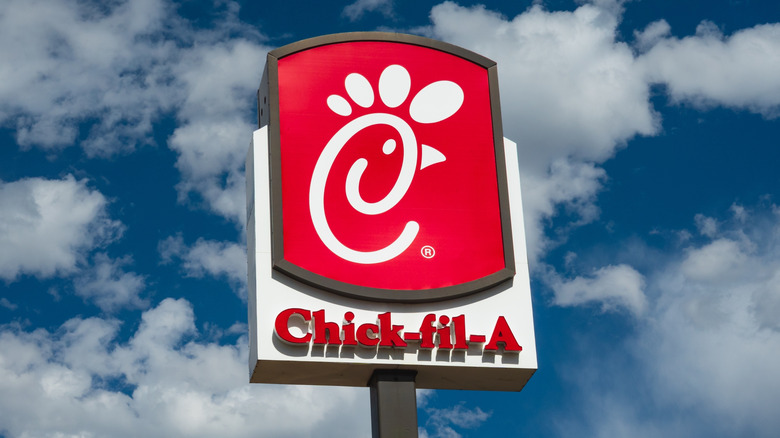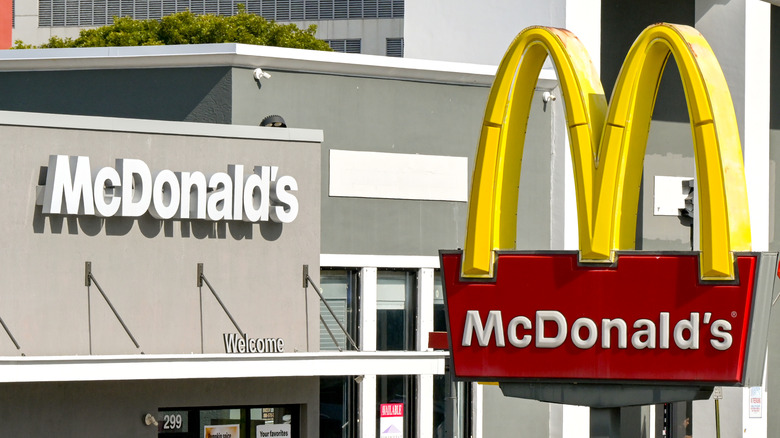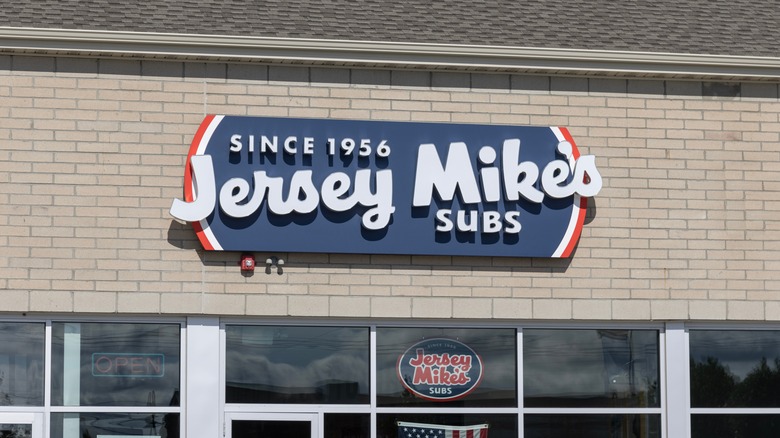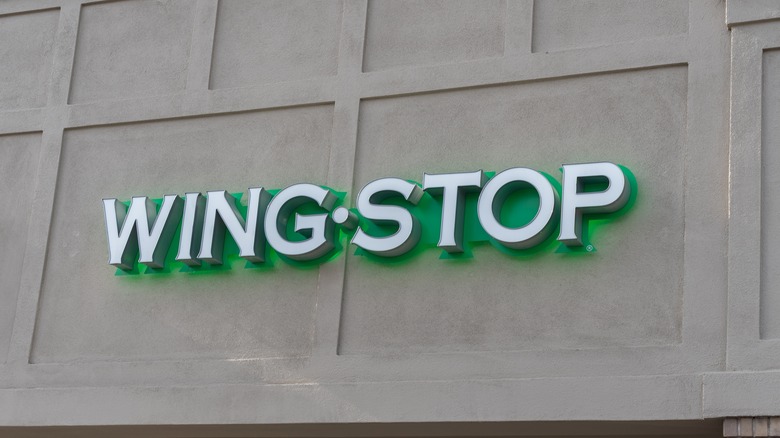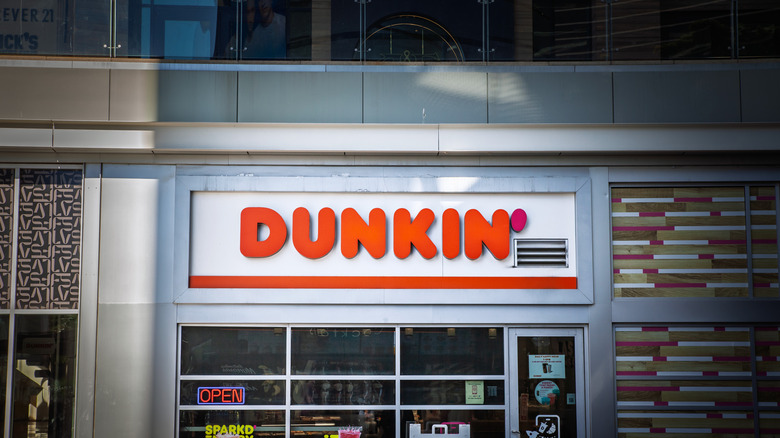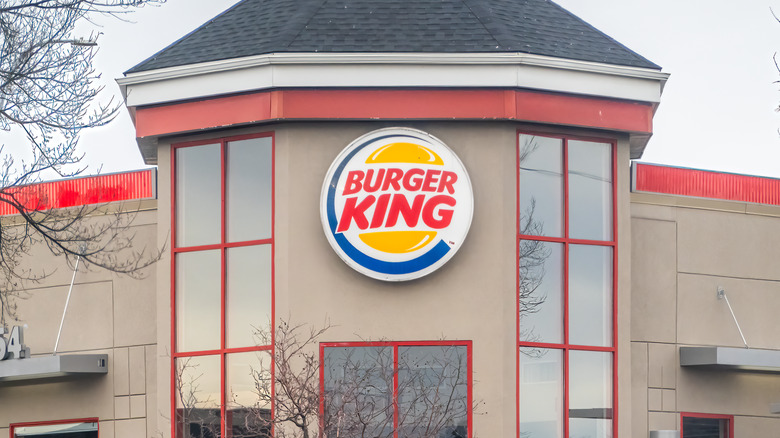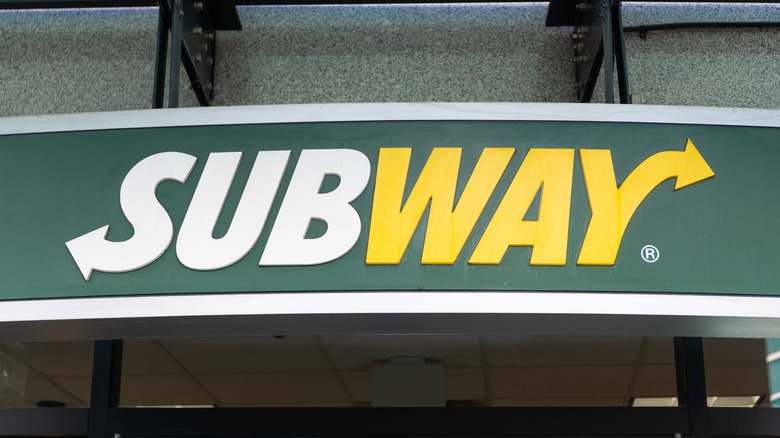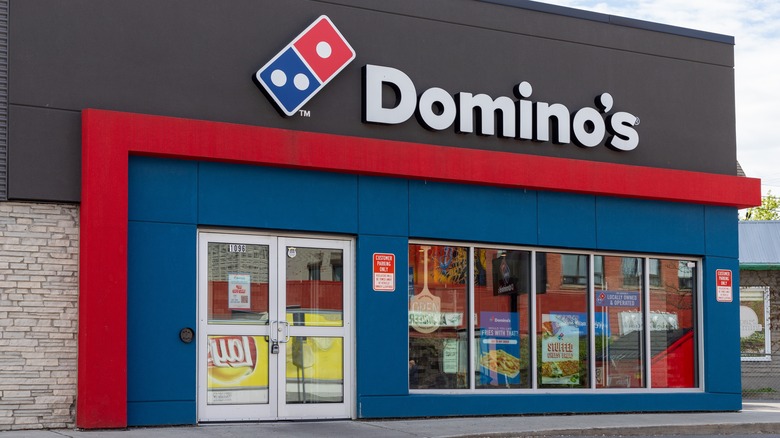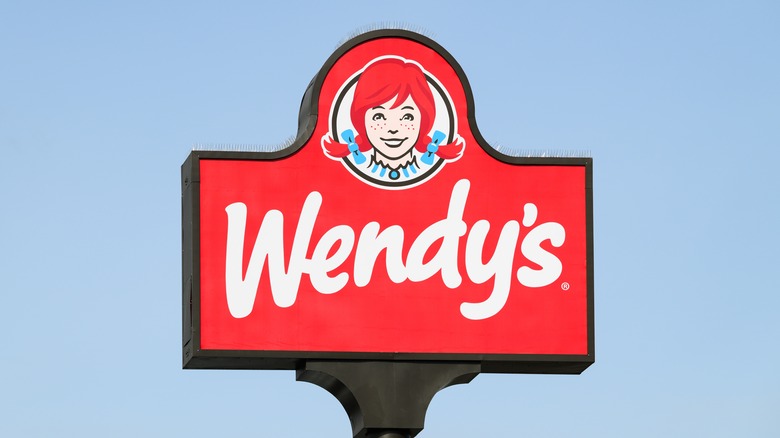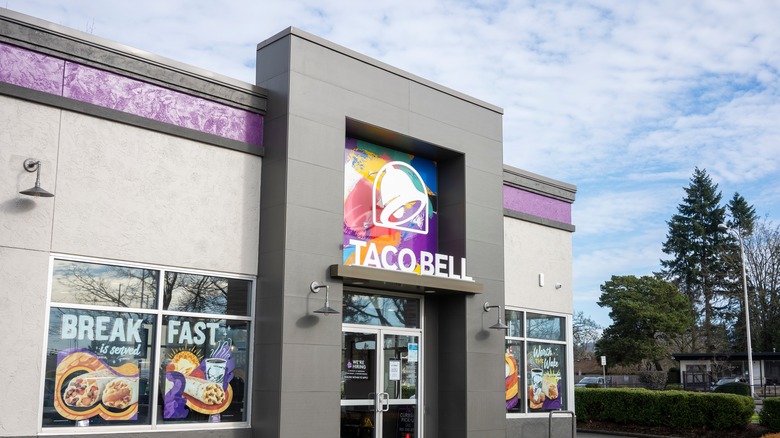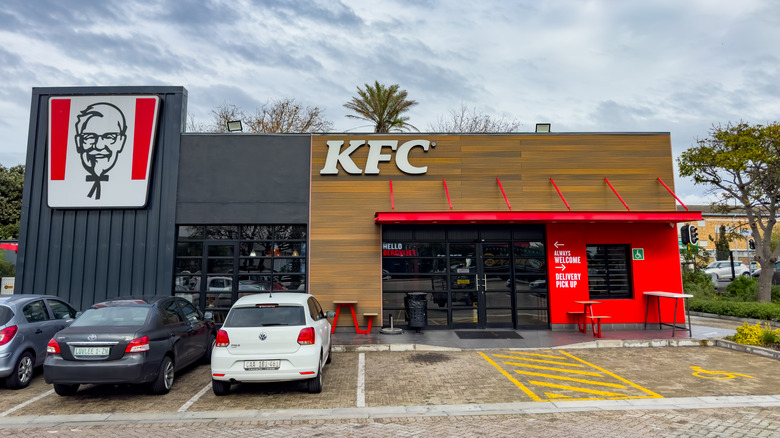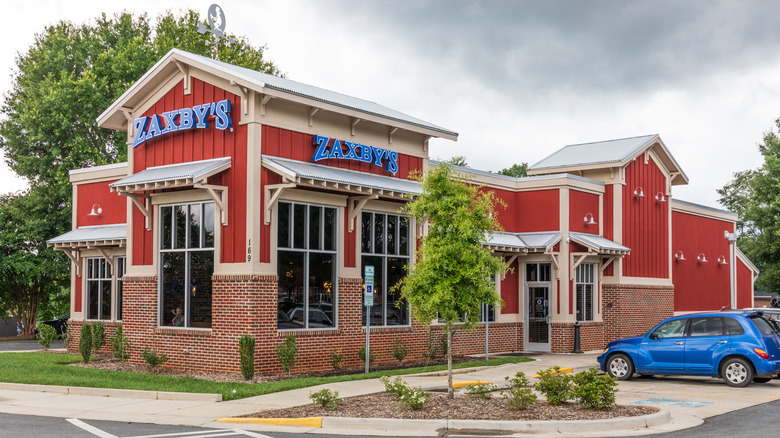How Much Money Do These Popular Restaurant Franchise Owners Really Make Each Year
Have you ever been to a restaurant overflowing with customers and wondered how much the franchise owner makes? Maybe you've even thought about owning a location of a successful chain yourself. If so, you're not alone. Franchising is the most popular business structure for big-name brands, with nearly two-thirds of restaurants operated by franchisees rather than directly company-owned, according to Bar and Restaurant News, This unique setup effectively operates as a blend between independent ownership and corporate management, giving entrepreneurs a turnkey operation complete with standardized branding, training, supply chains, software, and menus. With a convenient plug-and-play setup, many people assume franchises are a cash cow simply waiting to be milked.
In practice, brands actually demand a lot of financial and experiential buy-in from potential owners, including proof of a substantial net worth with decent liquidity and an upfront investment. Major restaurant chains already have proof of concept when it comes to their business operations. A potential franchise owner is the only new variable entering the equation, and companies want to make sure franchisees are fiscally secure enough to handle the early-on investments and day-in and day-out costs of running a revenue-generating branch. The upside to these initial requirements is a proven track record of success. In other words, owners who can effectively duplicate a restaurant's playbook are likely to see decent returns. How much exactly? Well, according to Franchise Business Review, the average franchise owner brings in $107,119 per year. That figure reaches $118,792 for locations open for more than two years, highlighting how owners can augment their income over time.
Chick-fil-A
Everybody has a strong opinion about whether Chick-fil-A offers the best chicken in the fast-food industry, but the topic is admittedly subjective. What's completely objective is Chick-fil-A's ranking as home to the most profitable franchises in the United States. On average, franchises rake in $8.74 million annually, according to Sharp Sheets. With a nationwide network of over 3,000 operations, the chicken chain is hauling in some serious returns. Those numbers are even more impressive when you realize the company is closed on Sunday, unlike the overwhelming majority of fast-food chains.
The company reports that more profitable stores can generate $9.22 million yearly, blowing the industry average return out of the water. Owners of those higher-earning locations can expect to take home a healthy $470,000, after the chain takes its cut. Realistically, that franchise owner figure is closer to $204,000, which is still dramatically higher than the country's average income.
How much a Chick-fil-A franchise owner makes per year offers only a snapshot of the full financial picture. The parent company demands operators make an upfront investment of $10,000 and divest themselves from all non-passive business arrangements. In other words, Chick-fil-A wants your undivided time and attention. Furthermore, the company wants to see no history of bankruptcies and a minimum of five years of business experience.
McDonald's
McDonald's is the largest franchise in the world, boasting about 42,000 locations and $26 billion in revenue. These sizable gains make their way down to franchise owners who earn about $150,000 on average, with each location generating about $2.7 million. That standard salary is more than twice the national average of $66,000. Even managers at McDonald's can make close to six figures, underscoring the financial success of America's beloved golden arches. The flagship fast-food restaurant has run up against industry-wide challenges of elevated operating expenses and more budget-conscious consumers, but McDonald's bold new growth strategy is intended to propel the company's already impressive returns even higher.
As you'll quickly see, judging how much a popular franchise owner actually makes isn't only about looking at their potential income. The math is only complete when factoring in their preliminary financial requirements. If you think McDonald's franchise owners make a surprising amount of money, just wait until you hear how much they need to invest. The burger-and-fry chain is thorough when vetting for what it has defined as a profitable franchise owner. You're obligated to contribute a minimum down payment of $45,000 and a net worth of $750,000. On top of that, the global behemoth recommends having another three-quarters of a million in liquid assets. Even after meeting these stringent financial standards, McDonald's warns on its franchise webpage that you might not qualify for the position.
Jersey Mike's
Other than both hailing from the Eastern Seaboard, Jersey Mike's is everything the Jersey Shore cast never managed to be: nationally celebrated and wildly successful. The sandwich shop's newfound fame has humble roots in the small town of Point Pleasant, New Jersey, but now stretches to all corners of the country with 3,000 franchises. Forbes describes Jersey Mike's differentiating factor as fast food that's "affordable luxury." Founder and CEO Peter Cancro, who is currently worth over $5.6 billion, went $125,000 in debt to bootstrap the company's founding. Now, the average revenue on a Jersey Mike's franchise is $1.29 million. This far exceeds the annual revenue of franchises of similar sub-style restaurants, which average around $838,000.
Those augmented gains overall translate into improved earning potential for individual shop owners. Although specifics vary by location and demand, the average owner can expect to earn around $194,000. Jersey Mike's sets an initial franchise fee of $18,500. However, the sandwich chain estimates total startup expenses to range between a minimum of $182,000 and a maximum of $1.4 million. The company is admittedly selective about who it brings on board to oversee a semi-independent location, urging potential franchisees to consider the risk involved and recognize that results aren't guaranteed. These sober warnings are reflected by impressive earnings for Jersey Mike's franchisees, suggesting many are successful in the long run.
Wingstop
Wingstop is unusually transparent about its average franchise costs, with many companies opting to only divulge this information further along in the process of vetting candidates. The chicken wing chain sets a $1.2 million net-worth threshold, with 50% needing to be in cash or cash equivalents. Furthermore, franchisees have to put forth a $30,000 initial investment. Wingstop provides an itemized breakdown of overall franchise ownership costs, which come in at $259,400 on the low end and $912,100 on the upper end. This range doesn't include real estate or lease expenses. The company only considers candidates with several years of experience developing and managing a restaurant with more than one location.
The wing empire's rigorous standards seem to pay off, with the average Wingstop location acquiring $2 million annually. Although total take-home pay depends on location, the average Wingstop franchisee can make $250,000, with a profit margin of around 20%. Founded in 1994, the global restaurant now has more than 2,250 locations, making it one of the fastest-growing wing-focused chains. In 2023, its total sales surged by more than 27%, reaching an impressive $3.5 billion — the second decade of straight non-stop growth. With about 98% of the chain's locations being franchises, Wingstop seems to believe that franchisee and company success are one and the same.
Dunkin'
Dunkin' is a formidable restaurant chain with over 13,200 locations in more than 60 countries around the globe. The company's rebranding move to drop "Donuts" from its name wasn't merely performative; the chain refocused its efforts to become known primarily as a cafe chain. The move paid off with Statista recognizing Dunkin' as the second-largest coffee brand in the U.S., right on the heels of the omnipresent Starbucks. According to the Securities and Exchange Commission, the most recent publicly available data suggests the Dunkin' brand generates $1.32 billion per year.
Although numbers aren't public, estimates indicate the average operator can earn a salary of $124,000. Locations in busier locations with greater demand can expect to bring in more, although results aren't guaranteed. As always, this potential income needs to be weighed against the upfront costs. Dunkin' mandates an early franchise fee of $40,000 or $90,000, depending on the operational costs of different locations. Also, the minimum net worth of a Dunkin' franchise owner is half a million, with $250,000 in liquid assets. All in all, a franchise owner can expect to invest between $526,900 and $1.8 million.
Steak 'n Shake
Steak 'n Shake may be most famous for introducing the world to the mouth-watering steakburger, but the chain is also one of the oldest fast food chains in the U.S. Founded in 1934, the burger-and-shake brand experienced decades of steady growth before hitting a period of minor decline in the mid-2010s. Over the past few years, a rebranding effort and company restructuring have pushed Steak 'n Shake back into the black, pulling in $20 million in 2024. These earnings are considerably lower than those of other chains on this list, but the classic diner boasts one of the lowest barriers to entry, only requiring a startup fee of $10,000.
Better yet, the company offers 50% of net profits for franchisees. Acknowledging the hefty requirements of most franchises, Steak 'n Shake made a concerted effort to open up its locations to more people, regardless of their financial standing. Even with a broader opening, the classic burger chain's locations still generate a respectable $1.73 million yearly, according to Sharp Sheets. Owners are estimated to bring home $260,000, proving that the franchises that cost the most to get started don't necessarily earn the most.
Burger King
Burger King has been neck-and-neck with McDonald's for years, perennially stuck in second place in the race for the world's largest burger chain. The constant runner-up position has been lucrative, with a total revenue of $1.5 billion, according to Statista. The Home of the Whopper operates over 19,000 locations in more than 100 countries globally. To improve its edge, Burger King has ramped up franchise expansion while keeping current locations open longer throughout the day and night. For those fast-food fanatics who are interested, the royal burger brand isn't actually self-owned. There's a mysterious parent company that owns Burger King.
The flame-grilling legend doesn't let owners have it their way without some skin in the game. The initial franchise fee is a considerable $50,000, and the company demands a net worth of $1 million. 50% of a candidate's total assets must be in liquid form. Burger King is frank about ongoing operation costs handled by franchisees: advertising, royalties, renovations, app license fees, training, and more. Despite these overhead expenses, franchise owners are projected to pocket about $227,000. Individual locations bring in over $1.5 million annually, according to Sharp Sheets.
Subway
Self-dubbed the world's largest sandwich brand, Subway has long competed with McDonald's for the record of the largest restaurant chain by number of locations in the world. Although the sub giant has lost the crown to the golden arches recently, it still has over 33,600 locations globally. Thus, Subway remains, by far, the most prolific sandwich-focused restaurant brand. Franchising has been one of the primary catalysts for its rapid growth and dominant expansion, with virtually 100% of the global sub shop's locations owned by individuals. Over the past few years, a growing number of Subway franchisees have filed for bankruptcy, alarming some investors and fans.
Despite this temporary weakness, Subway remains one of the strongest restaurant brands in U.S. history, raking in nearly $1 billion, according to Restaurant Business Online. Even with this strong performance, the footlong empire offers a minimal upfront franchise fee compared to most competitors, requiring only $15,000 per location. Additionally, Subway has notably lower net worth requirements. Owners only have to show $150,000 in net worth and $100,000 in cash-on-hand. This lower barrier to entry is rewarded with a higher average income, with estimates placing franchise yields at $490,000.
Domino's
Domino's describes itself as the largest pizza company in the world, and it's tough to argue the opposite. The publicly traded company took in a whopping $584.2 million in 2024, notching a 12.5% increase from the year prior. That upward momentum has continued into 2025, with income from operations up nearly 15% in the second quarter. Much of Domino's success is owed to its franchise structure. The pizza chain operates over 21,000 locations globally, with international operations owned by master franchises. This decentralized structure has allowed the brand to run relatively lean and offset some risks, while leaning on the proven accomplishments of its top-tier pizza and operational setup.
What's unique about Domino's franchise is that 95% of current owners in the U.S. were pizza delivery drivers or pizza makers for the company, highlighting the brand's upward mobility. However, the company still requires considerable investment to own a franchise. Simply getting a location off the ground can cost between $107,000 and $744,000, according to Sharp Sheets. On average, franchises earn $1.28 million, and operators receive about $192,000 of that total revenue annually. If you've heard about a spate of Domino's locations closing recently, don't worry. Most of these operations were in foreign countries, and the pizza chain's growth metrics remain on point.
Wendy's
Wendy's is the dark horse in the fast food race, falling just behind McDonald's and Burger King as the third-largest burger joint chain in the U.S. Famed for its fresh, never-frozen meat, square burgers, and Frosties, Wendy's has had a distinguished run since its founding in 1969. The global burger brand has exploded to 7,000 locations spanning across 30 different countries. In the first quarter of 2025, Wendy's added 74 new operations, underscoring the company's rapid growth. Plus, it's planning on aggressively expanding over the next several years, and franchise owners are a crucial component of that projected growth.
Fast food's most sarcastic social media star requires operators to prove a $1 million net worth with $500,000 in liquidity. Candidates must have experience running at least one restaurant. This initial investment could pay off rather quickly for locations that get off the ground, with Wendy's owners projected to take home around $297,000 yearly., according to Sharp Sheets. Another way to think about the restaurant's achievements over time is to consider how much money you'd have if you invested $1,000 in Wendy's 10 years ago. That one-grand investment would be worth around $2,320 today, nearly doubling in just a decade.
Taco Bell
Taco Bell is heralded as the largest Mexican-themed restaurant in the world, boasting an eye-popping 8,500 locations in 30 different nations. Total company sales have reached over $17 trillion, highlighting the taco-themed chain's meteoric growth since its establishment in 1962. In the past two years, Taco Bell was featured in Fast Company's Most Innovative Companies. The south-of-the-border-inspired restaurant chain has carved out a niche for itself, offering America's most popular cuisine in fast-food form. It's known for putting tasty spins on popular dishes, including the iconic Doritos Locos Tacos. Taco Bell has also built a reputation for the profitability of its vast franchise network.
The taco chain has consistently vied for a top spot on Entrepreneur's Franchise 500 — a rank-order list highlighting the best brands for franchisees to work with. According to the publication, Taco Bell is a promising company for entrepreneurs because of its global brand recognition, widespread popularity, aggressive growth, and franchisee support. These advantages don't come without some buy-in. Taco Bell requires an initial franchise fee of $25,000 or $45,000 and wants to see $1.5 million in net worth with a minimum of $750,000 in liquidity. Franchise owners make between $80,000 and $100,000 per year.
KFC
Kentucky Fried Chicken is owned by the world's largest restaurant parent company: Yum! Brands, which also owns Taco Bell and Pizza Hut. Of the corporation's 50,000 total restaurants, KFC comprises an impressive 15,000 independent operations. The fried chicken chain is present in 109 different countries and territories, but the highest concentration of locations is in the U.S.
KFC mirrors many of the same franchise requirements as its Mexican-themed counterpart. Eligible candidates must have a $1.5 million net worth, with 50% in cash or cash equivalents. The southern-style chicken joint sets an upfront franchise fee of $45,000 but offers financing options to help aspiring entrepreneurs. Yum Brands! takes a 5% royalty on gross income. Despite these operating expenses, franchisees often earn around $212,000, with individual locations earning $1.41 million annually, according to Sharp Sheets.
Zaxby's
The Franchise Times Top 400 recently featured Zaxby's in the Top 50 — a nod to the chicken brand's triumphant evolution over the past decade and a half of its lifespan. In the last available year, Zaxby's grossed a stunning $2.52 billion in systemwide sales. This is especially impressive considering the company has a fraction of the locations compared to other franchise-based chains on this list. However, Zaxby's is one of the many popular fried chicken chains opening more stores in 2025, signaling more opportunities on the horizon.
Zaxby's is the self-proclaimed best chicken franchise opportunity in the market. Only started in 1990, the company has exploded to more than 950 locations in 17 states across the country. It has yet to go international like many other fast-food chains on this list, but that means franchisees enjoy more hands-on support and a domestic focus. To own a Zaxby's franchise, you need to have $500,000 in liquid assets and a total net worth of $1 million. The initial franchise cost is $35,000. Franchise owners can choose between drive-thru only, small dine-in, or large dine-in operations. According to the company, the top quarter of franchise owners earn around $600,000 in gross revenue. Other estimates put the average closer to $400,000, according to Sharp Sheets, with profits of at least $52,800 and many owners netting over $100,000.

